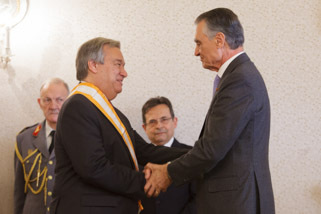
The Portuguese Author’s Association has decided, this year, to award the Literary Life Prize to Maria Velho da Costa.
This is a decision with which I can only be pleased, interpreting the feelings of her readers and admirers.
Maria Velho da Costa has treaded a path which, throughout almost half a century of publications and of intervening in our cultural world, is in effect extraordinary.
It probably cannot be described as what would normally be known as a career.
But true authors, such as stated not so very long ago by Mozambican Mia Couto, do not really have a career, since they spend their lives testing «the same fears and the same concerns», every time they start a new book.
Authors such as Maria Velho da Costa do no have a career, they have a creation.
Their history is combined with those they portrayed in their writings.
Their identity lies in the books they wrote and in the characters they created.
This is why we refer, when mentioning great authors such as Maria Velho da Costa, to a literary life
The recognition of Maria Velho da Costa’s work was practically unanimous, ever since her first book, Maina Mendes, was published.
This book was representative of a moment of renewal of written language and depiction processes, as has rarely happened in the 20th century. In this concern, Eduardo Lourenço wrote that it was «a unique virtuosity amongst us», and that «none of our contemporary literary works reallocates as successfully, the most creative experiences of Portuguese prose, from Fernão Lopes to Guimarães Rosa».
Maina Mendes did not just reveal an author endowed with a rare mastery in dealing with words. It also revealed an author who showed a deep knowledge of the Portuguese social environment at the end of the 60s, with all its contradictions and dilemmas.
To the non conformism of her writings and the constant search for new means of expression, Maria Velho da Costa already associated, at that time, the critical attitude and civic drive that she still maintains, in the defence of her convictions and of her values. I was thus very pleased to decorate her, on 25 April 2011, with the grade of Grand Officer of the Order of Freedom.
I will not linger over the books published by Maria Velho da Costa. Her work was translated and the object of academic studies.
The prizes awarded her, namely the Camões Prize in 2002, and now the Literary Life Prize, are sufficiently eloquent concerning a work that is avant garde but which, at the same time, is deeply rooted in our history and dialogues with the major writings of Portuguese literature.
The tribute we are paying her today is also a testimony of our appreciation of how far her work has gone to contribute towards the vitality and the projection of our culture.
I applaud the Portuguese Author’s Association for the award of this Prize to one who was also a former chairman of this society, and address Maria Velho da Costa my sincere congratulations. To which I add those of my wife who so often mentions you, with admiration, but also with the friendship that arises from the benches of the Lisbon Faculty of Arts.
Thank you for all you have achieved on behalf of our culture.
© 2006-2016 Presidency of the Portuguese Republic
You have gained access to the records of the Official Site of the Presidency of the Republic from 9 March 2006 to 9 March 2016.
The contents available here were entered in the site during the 10 year period covering the two mandates of President of the Republic Aníbal Cavaco Silva.